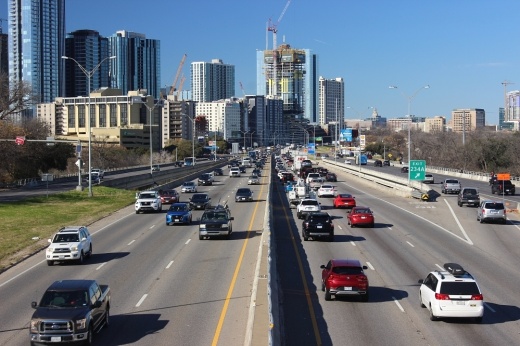“This session, there’s a real opportunity to improve quality of life—there’s education, there’s water, there’s transportation,” said Mustafa Tameez, a board member for Transportation Advocacy Group in Houston. “Transportation requires significant funding from the state ... so it’s important that our elected representatives give some emphasis and priority to transportation.”
State lawmakers have until March 14 to file bills for the regular legislative session, which ends June 2.
The details
Sen. Sarah Eckhardt and Rep. John Bucy, both Democrats representing Austin, filed legislation in November calling for a high-speed rail project that would link San Antonio, Austin and Dallas along I-35.
Under Senate Bill 424 and House Bill 483, Texas would partner with a private entity to build and operate a new rail line that would reach at least 110 miles per hour. The plan would modernize Texas transit, help prevent car accidents and reduce vehicle emissions, the lawmakers said.
“The I-35 corridor is a major hub for work and recreation, and it only makes sense that high-speed rail is an option for this corridor,” Bucy said in a statement. “You could live and work in Dallas, go to a meeting in Austin, have dinner in San Antonio, and be home in time to put your kids to bed. All of that without having to sit in heavy traffic or go through airport security.”
The proposals do not indicate how much it would cost to construct and maintain the rail project.
Meanwhile, HB 1402, by Rep. Cody Harris, R-Palestine, would prohibit the Legislature, state agencies or local governments from using public funds to construct high-speed rail projects.
Also of note
Rep. Stan Gerdes, R-Smithville, filed HB 1589, which would require voter approval for new toll projects. Beginning Sept. 1, toll entities would not be allowed to construct new toll lanes or roads unless authorized by voters in each county impacted by the project.
Gerdes said commuters are “over-taxed” and should have more input in toll projects they pay for.
“They especially don’t need to pay another fee just to get to work and back home every day without sitting in traffic for hours on end,” Gerdes said in a statement. “These projects need to be fully justified to the taxpayer.”
Tameez said taxpayers already have a say in the tolling process, because regional toll authorities are under the jurisdiction of county commissioners courts in their service areas. According to the Texas Transportation Code, the governor appoints one member to a toll authority’s board of directors, and each local commissioners court appoints at least two board members.
“People want options in transportation, and tolling is an option,” Tameez said. “You don't always have to use a toll road, and so people that use it often say that it's safer, it gets them there faster. It's a financing vehicle that allows us to build infrastructure quicker.”
Other bills to watch
Distracted drivers could pay higher fines under a proposal from Rep. Charles Cunningham, R-Humble. HB 1357 would set a fine of $100-$200 for using a portable wireless device, such as a cellphone, while operating a moving vehicle. The use of hands-free devices is protected in state statute.
The current fine is $25-$99, per the state transportation code. Cunningham said a local law enforcement officer asked him to file the legislation.
“It is common sense that usage of them while operating a vehicle is a huge safety issue,” Cunningham said in a statement. “Increasing the penalty would help deter drivers from engaging in unsafe behavior.”
TAG Houston supports Vision Zero, a statewide effort to reduce traffic injuries and fatalities to zero. At least one person has died daily on Texas roads since Nov. 7, 2000, according to the Texas Department of Transportation.
“We have to find ways to keep people's attention on the road, and all of us are just more distracted than ever before, so we think it's an interesting solution,” Tameez said, noting that TAG Houston has not taken an official position on HB 1357.
Other transportation-related proposals filed this session include:
- HB 427, by Rep. Briscoe Cain, R-Deer Park: This bill proposes allowing pregnant Texans to drive in high-occupancy vehicle lanes at all times, regardless of whether another passenger is present.
- HB 535, by Rep. Ray Lopez, D-San Antonio: Lopez’s bill would require motorists in cities with at least 100,000 residents to drive at least 3 feet away from pedestrians and cyclists at all times.
- HB 1170, by Rep. Richard Peña Raymond, D-Laredo: This measure would direct the Texas Department of Public Safety to analyze emerging and future threats to transportation security in Texas.
- HB 1625, by Rep. Cody Vasut, R-Angleton: Vasut’s bill proposes that a person's driver license be suspended if they hit an emergency vehicle, tow truck or similar vehicle stopped alongside a roadway.
State lawmakers have an estimated $194.6 billion available for general-purpose spending as they write the 2026-27 state budget, Texas Comptroller Glenn Hegar announced Jan. 13. This includes a $23.8 billion surplus, which Hegar said will be left over from the 2024-25 budget cycle ending Aug. 31.
Rep. Caroline Harris Davila, R-Round Rock, who served on the Texas House Transportation Committee during the 88th Legislature, said lawmakers need to “be smart” when writing the budget and investing in transportation projects.
“Part of that is stewarding taxpayer money—when it comes in to us to spend on roads and infrastructure, are we being responsible with it?” Harris Davila said during a Dec. 12 panel hosted by the Austin Chamber. “We all know that every new road we build, we are also responsible for the maintenance of that road, and that's a continuing expense.”





